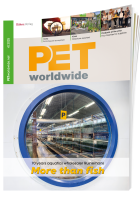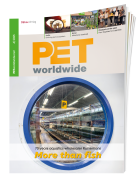Our family dogs have more variations in their appearance than any other domestic animal and yet they still share many attributes with their wild relative – the wolf. One legacy of dogs’ evolution and their similarities to the wolf is their wide field of vision; up to 270° compared to 180° in humans, and they can recognise a moving object up to one kilometre away. A dog’s night vision is also improved by a mirror-like tissue in the eye that reflects more light back into the eye. Another attribute demonstrating its wild history is its outstanding scenting ability. Some breeds have up to 220 million olfactory cells (smell-sensitive cells) in their nose, compared to only five million in humans, giving them incredible scenting ability. Exceptional hearing is another contributory factor allowing dogs to detect sounds at lower and much higher frequencies than humans. The positioning and mobility of the ears help pinpoint sound much faster too, and at up to four times the distance of the human ear. And then there are their teeth; powerful jaws and sharp teeth evolved from animals designed as carnivores. And, like most carnivores, they have a pair of blade-like teeth, the carnassials, located in the upper and lower jaws and working with a scissor-like action to slice through meat. Like its wild cousins, the domestic dog has a short simple digestive tract specifically designed to process meat. It has evolved from a carnivore and is built to digest primarily animal protein and fat. So while a human diet can be higher in fibre and lower in fat, dogs need more fat, for energy and a healthy skin and coat, with a smaller proportion of fibre to promote good intestinal health. A dog is not built to digest high levels of fibre, plants or vegetables. This becomes even clearer when you compare the intestinal tract of a true herbivore – the sheep – to that of a dog. A sheep’s intestinal tract is ² 35 metres long, such a length being required to be able to break down all the grass they eat. A dog’s relatively short intestinal tract of between 2 and 5.7 metres is clearly more tailored to animal protein rather than vegetable protein. The “Eukanuba” concept Dogs evolved from carnivores and therefore Procter & Gamble (“Eukanuba”) believes that dogs are best fed a diet based on animal protein coming from high-quality meat ingredients. A diet rich in animal-based proteins contains a full complement of essential amino acids…

Focus on animal-based proteins
Our family dogs have more variations in their appearance than any other domestic animal and yet they still share many attributes with their wild relative – the wolf. One legacy of dogs’ evolution and their similarities to the wolf is their wide field of vision; up to 270° compared to 180° in humans, and they can recognise a moving object up to one kilometre away. A dog’s night vision is also improved by a mirror-like tissue in the eye that reflects more light back into the eye. Another attribute demonstrating its wild history is its outstanding scenting ability. Some breeds have up to 220 million olfactory cells (smell-sensitive cells) in their nose, compared to only five million in humans, giving them incredible scenting ability. Exceptional hearing is another contributory factor allowing dogs to detect sounds at lower and much higher frequencies than humans. The positioning and mobility of the ears help pinpoint sound much faster too, and at up to four times the distance of the human ear. And then there are their teeth; powerful jaws and sharp teeth evolved from animals designed as carnivores. And, like most carnivores, they have a pair of blade-like teeth, the carnassials, located in the upper and lower jaws and working with a scissor-like action to slice through meat. Like its wild cousins, the domestic dog has a short simple digestive tract specifically designed to process meat. It has evolved from a carnivore and is built to digest primarily animal protein and fat. So while a human diet can be higher in fibre and lower in fat, dogs need more fat, for energy and a healthy skin and coat, with a smaller proportion of fibre to promote good intestinal health. A dog is not built to digest high levels of fibre, plants or vegetables. This becomes even clearer when you compare the intestinal tract of a true herbivore – the sheep – to that of a dog. A sheep’s intestinal tract is ² 35 metres long, such a length being required to be able to break down all the grass they eat. A dog’s relatively short intestinal tract of between 2 and 5.7 metres is clearly more tailored to animal protein rather than vegetable protein. The “Eukanuba” concept Dogs evolved from carnivores and therefore Procter & Gamble (“Eukanuba”) believes that dogs are best fed a diet based on animal protein coming from high-quality meat ingredients. A diet rich in animal-based proteins contains a full complement of essential amino acids…

 Menü
Menü






 11-12/2008
11-12/2008












 Newsletter
Newsletter